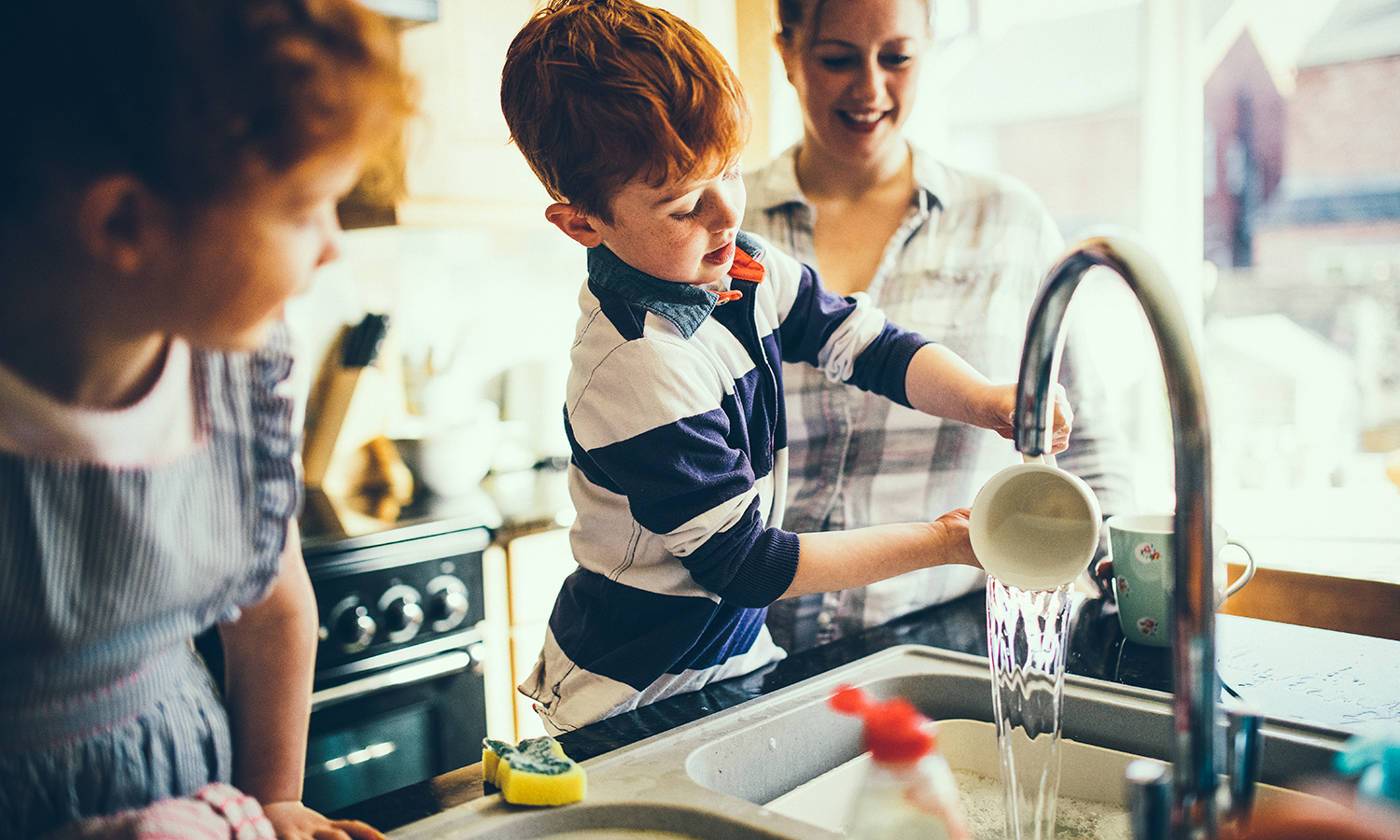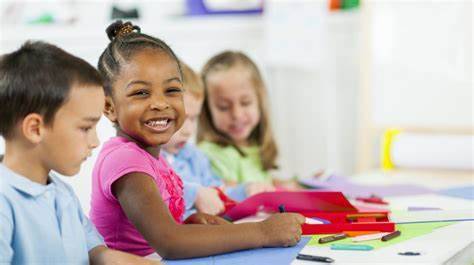Table of Contents
I’m sure that you want your children to grow into responsible and independent individuals who can conquer the challenges of adulthood with confidence. Well, it’s not always easy to find the perfect formula for your child to possess these qualities.
But we at Omega Pediatrics believe there is one effective method that often goes overlooked: household chores.

Why Your Child Needs To Learn Household Chores
While chores may seem ordinary, they offer numerous benefits that extend far beyond the simple act of cleaning! Engaging your children in household chores can have a lasting impact on their growth and development.
Life Skill Development
Learning household chores equips your children with practical life skills that they will carry into adulthood. They develop essential skills such as cleaning, cooking, and organization that will benefit them throughout their lives.
By letting your children complete self-care tasks while still in the house, you’re helping them develop the skills to function on their own outside the home.
Enhanced Responsibility and Independence
Engaging in household chores teaches your children about responsibility and the importance of contributing to the family. They may learn to take ownership of their tasks and become more independent in managing their personal space and belongings.
A Self-Confidence Boost
As your kids complete household chores, they gain a sense of accomplishment and build self-confidence. Mastering tasks such as making their bed or organizing their toys instills a sense of pride and self-assurance in their abilities.

Improved Organizational and Time Management Skills
Engaging in household chores teaches your children valuable time management and organizational skills. They learn to prioritize tasks, manage their time effectively, and maintain a structured routine, which translates into improved productivity in other aspects of their lives.
Teaches Teamwork
Being a productive member of the household team through housework Kids become accountable for each other, and there are instances when members don’t meet each other’s expectations.
Learning these lessons at home, where mistakes are easily forgiven, helps kids develop strong teamwork to use at school or work.
A Strong Work Ethic
Children learn the importance of hard work, perseverance, and a sense of fulfillment after completing tasks to the best of their abilities. These values lay the groundwork for success in academic, personal, and professional endeavors later in life.
Household Chores Your Child Needs To Know
Teaching your child household chores not only helps lighten your load as a parent but also instills important life skills and responsibilities. By involving them in age-appropriate tasks, you’re empowering them to become independent and capable individuals.
Here are some of the most important chores your child should know how to do:
1. Making the bed
Show your child how to straighten out the fitted sheet and tuck it tightly under the mattress. Demonstrate how to layer the flat sheet, blankets, and comforter, ensuring they’re smooth and even. Encourage your child to practice making their bed daily until they can do it independently, praising their progress along the way.
2. Setting the table
Teach your child about proper table settings for different occasions, such as informal meals or special gatherings. Explain the placement of utensils, napkins, and glasses. Provide a visual guide or placemat with illustrations to help them remember the correct arrangement.
3. Clearing the table
Demonstrate clearing the table after a meal. Show your child how to gather all the dishes, scrape leftover food into the trash or compost, and stack dirty dishes for washing. Encourage them to be mindful of any spills or crumbs and wipe the table surface clean.
4. Washing dishes
If washing dishes by hand, show your child how to fill the sink with warm, soapy water and explain the order in which to wash items to avoid cross-contamination. Teach them to scrub dishes, rinse thoroughly, and dry them properly.
If using a dishwasher, explain how to load and unload dishes, ensuring they’re correctly placed for efficient cleaning.
5. Folding laundry
Demonstrate different folding techniques for various clothing items, such as folding shirts, pants, and socks. Teach your child how to fold and stack clothes neatly, emphasizing maintaining wrinkle-free garments. Let them practice folding their clothes, and encourage them to take pride in their neatly folded laundry
6. Sorting laundry
Sort laundry by color and fabric type. Show your child how to separate lights from darks and delicates from regular items. Explain the significance of sorting to prevent color bleeding or damage to delicate fabrics. Discuss different fabrics and their care instructions.
7. Sweeping the floor
Guide your child on proper sweeping techniques, starting from the edges and working toward the center of the room. Show how to hold the broom and use long, smooth strokes to gather dust and debris. Teach them to gather the pile into a dustpan and dispose of it in the garbage or compost bin.
8. Vacuuming
Show your child how to use a vacuum cleaner, including attachments for different surfaces and furniture. Explain the correct technique for maneuvering the vacuum and covering all areas of the carpet. Teach them to be thorough in vacuuming, ensuring they reach under furniture and along baseboards.
9. Dusting
Dust surfaces using a microfiber cloth or feather duster. Show your child how to gently wipe down furniture, shelves, and electronics, paying attention to intricate details and hard-to-reach areas. Encourage them to be thorough, ensuring they remove dust from all surfaces.
10. Taking out the trash
Explain the importance of proper waste disposal and recycling. Tie up garbage bags securely and dispose of them in the appropriate outdoor bin. Teach your child about recycling bins and encourage them to separate recyclable items.
11. Watering the plants
Show your child the proper amount of water to use and how to avoid overwatering. Check the soil moisture level and explain underwatering or overwatering. Show them how to water evenly and reach all areas of the plant. Encourage learning about plant species and their watering needs.
12. Sweeping outdoor areas
Sweep outdoor areas using a broom or a leaf blower. Demonstrate how to gather leaves, dirt, or debris into a pile and dispose of it properly. Pay attention to corners, cracks, and edges for thorough cleaning. Encourage them to take pride in keeping the outdoor spaces tidy and enjoyable for everyone.
13. Raking leaves
Demonstrate different raking techniques, such as gathering leaves into piles or creating a neat row. Show them how to dispose of the leaves in a compost bin or yard waste bag. Discuss the changing seasons and the importance of maintaining a clean yard.
14. Wiping the countertops
Show your child how to clean and wipe down kitchen or bathroom countertops using a non-abrasive cleaner and a cloth. Demonstrate the proper technique for removing spills, crumbs, and stains.
Teach them to be thorough, reaching all areas of the countertop, including corners and edges. Encourage them to develop good hygiene habits by keeping the surfaces clean and sanitary.
15. Cleaning the windows
Demonstrate how to clean windows and mirrors using a window cleaner, a lint-free cloth, and a squeegee if necessary. Show your child the proper technique for spraying the cleaner, wiping the surface, and removing streaks.
Teach them to pay attention to corners and edges for a thorough cleaning. Engage them in discussions about the importance of maintaining clear windows for natural light and a pleasant view.
16. Organizing their toys
Encourage your child to actively participate in organizing their toys. Teach them how to sort toys into categories, such as dolls, cars, or building blocks. Show them how to assign specific storage bins or shelves for each category.
Demonstrate the importance of putting toys back in their designated places after playtime. Encourage them to declutter periodically and donate toys they no longer play with, teaching them about sharing and giving to others.
17. Dusting the bookshelves
Show your child how to dust bookshelves using a microfiber cloth or a feather duster. Demonstrate the proper technique of removing books, dusting each shelf thoroughly, and rearranging the books neatly.
Teach them to be gentle while dusting delicate items and to pay attention to the small spaces between books. Engage them in conversations about different genres of books and encourage their love for reading and learning.
18. Cleaning their room
Guide your child through cleaning and organizing their room. Start with decluttering, sorting items into categories such as clothes, books, toys, and school supplies. Demonstrate how to dust surfaces, make the bed, vacuum or sweep the floor, and put away belongings in their designated places.
Teach them the importance of maintaining a clean and organized personal space for comfort and productivity. Encourage them to take ownership of their room’s cleanliness, fostering a sense of responsibility and pride.

Teach Responsibility to Your Children
All parents strive to raise capable and self-sufficient children who are fully prepared to navigate the complexities of adulthood. An effective approach to instilling these desirable qualities involves engaging your children in various tasks around the house.
Although initially perceived as mundane, such chores encompass a multitude of extensive advantages that surpass the mere act of tidying up. By instructing your children in age-appropriate household responsibilities, you cultivate fundamental life skills, nurture a work ethic, and foster responsibility and autonomy.
We at Omega Pediatrics believe that you should teach responsibility to your children through household chores. These can help your child develop necessary physical, mental, and cognitive skills that can help them when they grow up as adults.
FAQ
Why should my child learn household chores?
Learning household chores not only teaches practical life skills but also instills responsibility, independence, and a strong work ethic in children.
How can household chores boost my child’s self-confidence?
Completing tasks like making the bed or organizing toys gives children a sense of accomplishment, fostering pride and self-assurance in their abilities.
What are some household chores that children can start learning?
Children can start learning tasks like making the bed, setting the table, washing dishes, folding laundry, sweeping, vacuuming, dusting, taking out the trash, watering plants, and more.
How do household chores teach teamwork?
Engaging in household chores as a family teaches children about accountability, cooperation, and the importance of working together to achieve common goals.
What skills do children develop by learning household chores?
Children develop essential life skills such as time management, organization, problem-solving, and attention to detail through participating in household chores.



